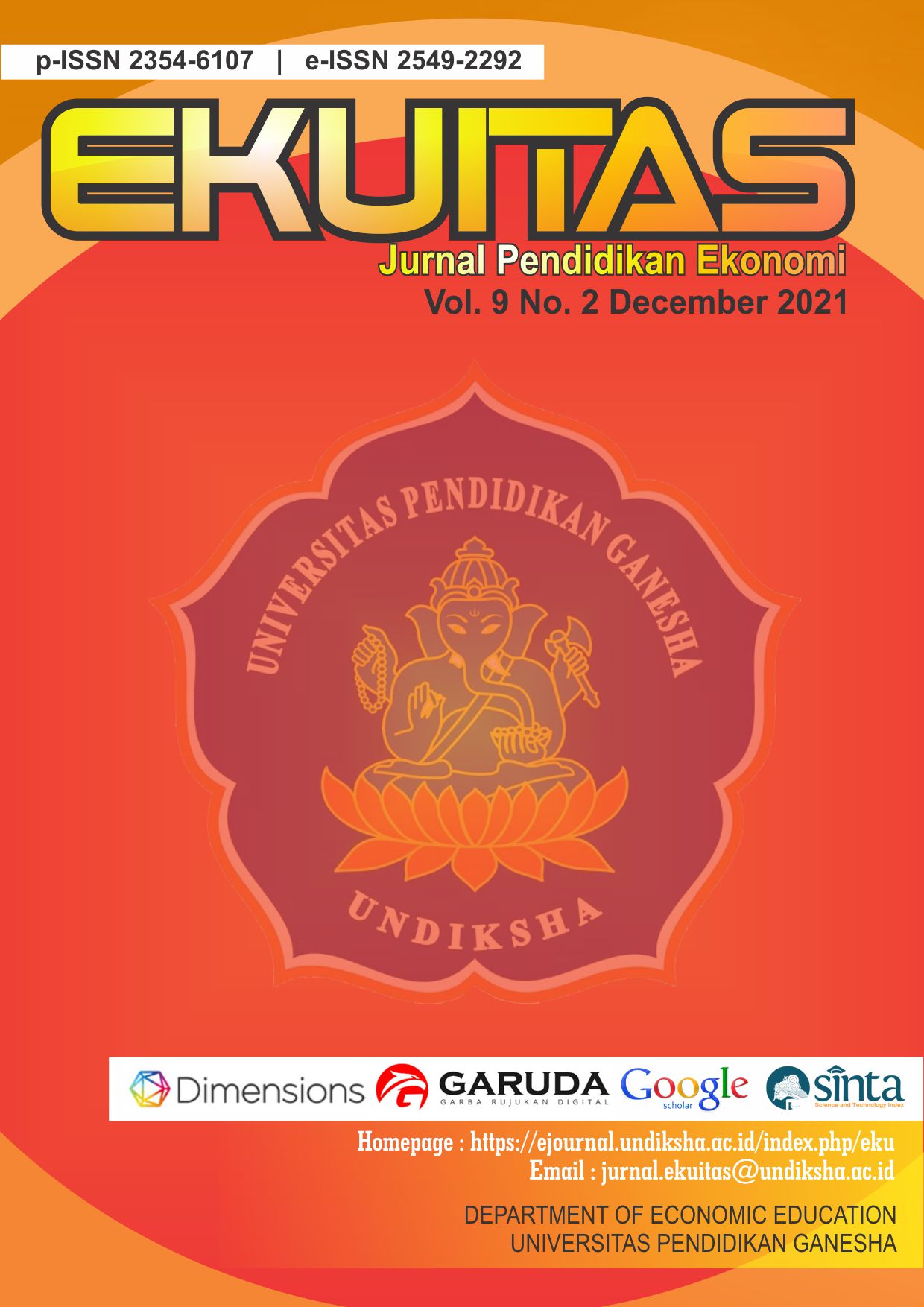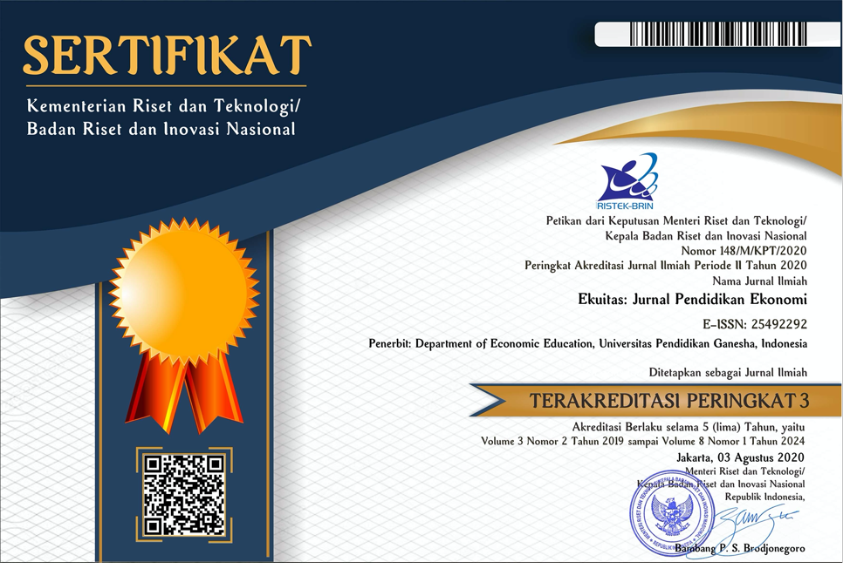Pengembangan Digital Learning Kit untuk Membantu Meningkatkan Kompetensi Siswa dalam Perhitungan Biaya Produksi dan Penetapan Harga
DOI:
https://doi.org/10.23887/ekuitas.v9i2.41102Keywords:
digital learning, student competenciesAbstract
We must overcome students' low understanding of cost accounting courses with learning models that follow learning needs. Blended learning answers these problems, namely, using learning kits in modules, handouts, videos, and questions. This study aimed to determine the effectiveness of the use of the blended learning model on student learning outcomes in cost accounting courses at the State University of Malang. Based on the results of the tests carried out, it was found that there were differences in student learning outcomes that were equipped with a learning kit and students who did not equip. This indicates that students get a better understanding conceptually or in solving real problems. Learning models equipped with learning kits will improve student competence as reflected in learning outcomes.References
Anik, A. P. (2013). Evaluasi Penerapan Akuntansi Pertanggungjawaban Sebagai Alat Pengendalian Biaya Produksi. Jurnal EMBA, 1(4), 1667–1676.
Argaheni, N. B. (2020). A systematic review: The impact of online lectures during the COVID-19 Pandemic against Indonesian students. Jurnal Ilmiah Kesehatan Dan Aplikasi, 8(2), 99–108.
Arivina, A. N. (2020). Development of trigonometry learning kit with a STEM approach to improve problem-solving skills and learning achievement. Jurnal Riset Pendidikan Matematika, 7(2), 178–194.
Blake, H., Bermingham, F., Johnson, G., & Tabner, A. (2020). Mitigating the psychological impact of Covid-19 on healthcare workers : A digital learning package. International Journal of Environmental Research and Public Health, 17, 1–15.
Burdick, A., & Willis, H. (2011). Digital learning, digital scholarship and design thinking. Design Studies, 32(6), 546–556.
Castaño-muñoz, J., Colucci, E., & Smidt, H. (2018). Free digital learning for inclusion of migrants and refugees in Europe: A qualitative analysis of three types of learning purposes. International Review of Research in Open and Distributed Learning, 19(2), 1–18.
Cook, T. D., & Campbell, D. T. (1979). Quasi-experimentation: Design & Analysis Issues for Field Settings. Houghton Mifflin.
Dunia, F. A., Abdullah, W., & Sasongko, C. (2019). Akuntansi biaya. Jakarta: Salemba Empat.
Ghozali, I. (2013). Aplikasi Analisis Multivariate dengan Program IBM SPSS 21 Update PLS Regresi. Semarang: Badan Penerbit Universitas Diponegoro.
Hair, J. F., Black, W. C., Babin, B. J., Anderson, R. E., & Black, W. C. (2019). MULTIVARIATE DATA ANALYSIS Multivariate Data Analysis. Annabel Ainscow.
Isa, R. binti M., & Azero, M. A. bin. (2013). Assessment Feedback to Accounting Students. Procedia - Social and Behavioral Sciences, 90, 651–659. https://doi.org/10.1016/j.sbspro.2013.07.137
Lin, M., Chen, H., & Liu, K.-S. (2017). A study of the effects of digital learning on learning motivation and learning outcome. EURASIA Journal of Mathematics Science and Technology Education, 13(7), 3553–3564.
Marwanto, M., & Patabang, L. (2017). Evaluasi Proses Belajar Mahasiswa Dalam Akuntansi Biaya Dengan Strategi Peninjauan Kembali “Holly-Wood Squares.” Journal of Applied Managerial Accounting, 1(2), 91–98. https://doi.org/10.30871/jama.v1i2.496
Matapere, N. M., & Nugroho, P. I. (2020). Pengaruh Hasil Belajar Pengantar Akuntansi Terhadap Tingkat Pemahaman Akuntansi Mahasiswa Prodi Akuntansi UKSW Dengan Motivasi Belajar Sebagai Variabel Moderasi. Jurnal Manajemen, Ekonomi Dan Akuntansi, 4(1), 257–270.
Matulich, E., Papp, R., & Haytko, D. L. (2008). Continuous Improvement through Teaching Innovations: a Requirement for Today’s Learners. Marketing Education Review, 18(1), 1–7. https://doi.org/10.1080/10528008.2008.11489017
McCartthy, M., Kusaila, M., & Grasso, L. (2018). Intermediate accounting and auditing: Does course delivery mode impact student performance? Journal of Accounting Education, 12, 1–17.
Montiel, I., Delgado-Ceballos, J., Ortiz-de-Mandojana, N., & Antolin-Lopez, R. (2020). New Ways of Teaching: Using Technology and Mobile Apps to Educate on Societal Grand Challenges. Journal of Business Ethics, 161(2), 243–251. https://doi.org/10.1007/s10551-019-04184-x
Nurkhin, A. (2013). Efektivitas Pembelajaran Tutor Sebaya dalam Pembelajaran Akuntansi Biaya 1. Jurnal Pendidikan Ekonomi Dinamika Pendidikan, 8(1), 26–37.
Nurtanio. (2019). Analisis Perhitungan Harga Pokok Produksi dengan Penerapan Metode Full Costing pada UMKM Kota Banda Aceh. Jurnal Ilmiah Mahasiswa Ekonomi Akuntansi, 1(2), 59–70.
Parkes, S., Zaka, P., & Davis, N. (2011). The first blended or hybrid online course in a New Zealand secondary school : A case study. Computers in New Zealand Schools: Learning Teaching, Technology, 23(1), 1–30.
Peters, O. (2000). Digital learning environments: new possibilities and opportunities. Review of Research in Open and Distance Learning, 1(1), 1–19.
Poon, J. (2013). Blended learning: An institutional approach for enhancing students’ learning experiences. Journal of Online Learning and Teaching, 9(2), 271–288.
Prastowo, A. (2016). Pengembangan Bahan Ajar Tematik: Tinjauan Teoritis dan Praktik. Prenada Media.
Sarigöl, J., & Akdeniz, A. R. (2014). The Effect of the Course of Teaching Practice on Prospective Science Student Teachers’ Teaching Methods and Technical Knowledge of the Subject of Electromagnetism. Procedia - Social and Behavioral Sciences, 136, 463–468. https://doi.org/10.1016/j.sbspro.2014.05.357
Saxena, N. (2019). Pallas advanced learning systems- a research-informed virtual learning kit. Journal of Applied Learning & Teaching, 2(1), 65–68.
Sayaf, A. M., Alamri, M. M., Alqahtani, M. A., & Al-rahmi, W. M. (2021). Information and communications technology used in higher education: An empirical study on digital learning as sustainability. Sustainability, 13, 1–19.
Septiana, Y. (2020). PERSEPSI MAHASISWA TENTANG IMPLEMENTASI BLENDED LEARNING PADA MATA KULIAH STRATEGI PEMBELAJARAN AKUNTANSI. Business and Acconting Journal, 1(3), 213–221.
Sholihin, M., Sari, R. C., Yuniarti, N., & Ilyana, S. (2020). A new way of teaching business ethics: The evaluation of virtual reality-based learning media. International Journal of Management Education, 18(3), 1–18. https://doi.org/10.1016/j.ijme.2020.100428
Slameto. (2010). Belajar dan Faktor-Faktor yang Mempengaruhi. Jakarta: Rineka CIpta.
Suana, W., Maharta, N., I, N., & Wahyuni, S. (2017). DESIGN AND IMPLEMENTATION OF SCHOOLOGY-BASED BLENDED LEARNING MEDIA FOR BASIC PHYSICS I COURSE. Jurnal Pendidikan IPA Indonesia, 6(1), 23–31. https://doi.org/10.15294/jpii.v6i1.7205
Sugiyono. (2014) Metode Penelitian Kualitatif dan Kuantitatif. Bandung: CV Alfabeta
Sumarsih, M. (2016). Pengembangan Multimedia Akuntansi Biaya Metode Harga Pokok Pesanan Bagi Mahasiswa Jurusan Pendidikan Akuntansi UNY. Jurnal Inovasi Teknologi Pendidikan, 3(1), 92–105.
Tafakur, Sukaswanto, Solikin, M., & Wardani, F. R. (2020). The development of training kit for basic electronic Control on automotive feld. Journal of Physics: Conference Series, 1, 1–9.
Thorne. (2003). Blended learning: How to integrate online and traditional learning. UK: Kogan Page.
Ulva, S. (2017). Developing PBL kit by utilizing blog in order to improve scientific process and problem solving skills in physics learning. Jurnal Inovasi Pendidikan IPA, 3(1), 89–100.
Vermeulen, M., Kreijns, K., Buuren, H. Van, & Acker, F. V. (2016). The role of transformative leadership, ICT-infrastructure and learning climate in teachers use of digital learning materials during their classes. British Journal of Educational Technology, 48(6), 1427–1440.
Winne, P. H., Hadwin, A. F., & Gress, C. (2010). The learning kit project: Software tools for supporting and researching regulation of collaborative learning. Computers in Human Behavior, 26(5), 787–793.
Yoosomboon, S., & Wannapiroon, P. (2015). Development of a challenge based learning model via cloud technology and social media for enhacing information management skills. Procedia - Social and Behavior Sciences, 174, 2102–2107.
Zwart, D. P., & Luit, J. E. H. Van, Noroozi, O., Goei, S. L. (2017). The effects of digital learning material on student’s mathematics learning in vocational education. Cogent Education, 29(1), 1–10.








